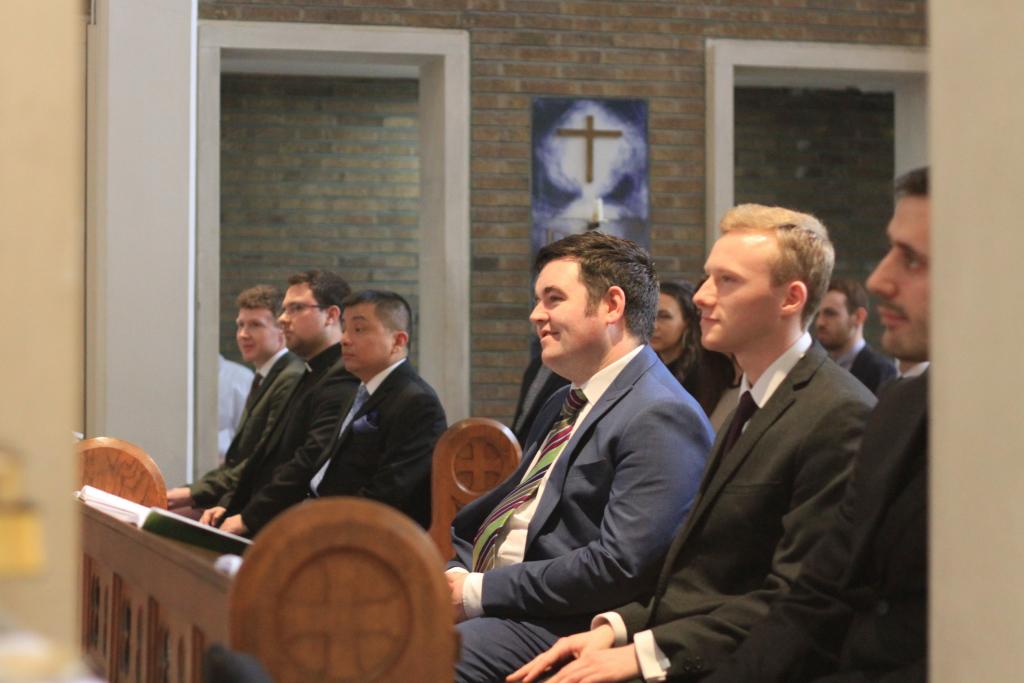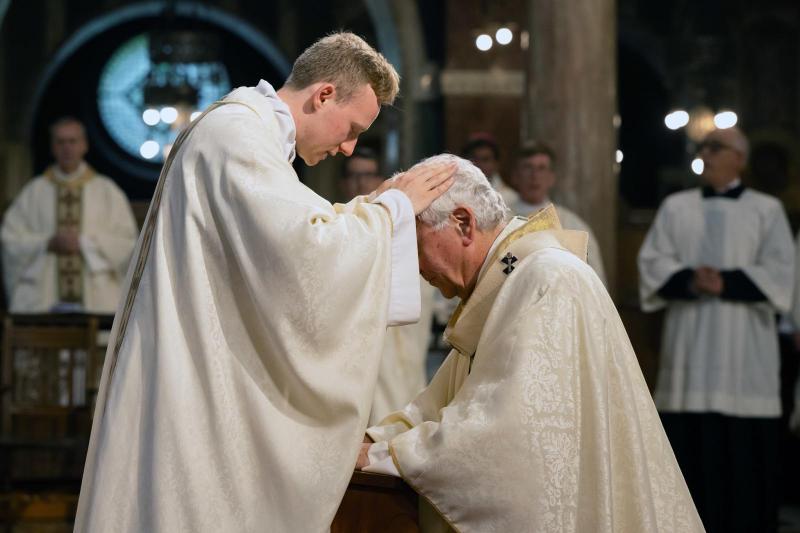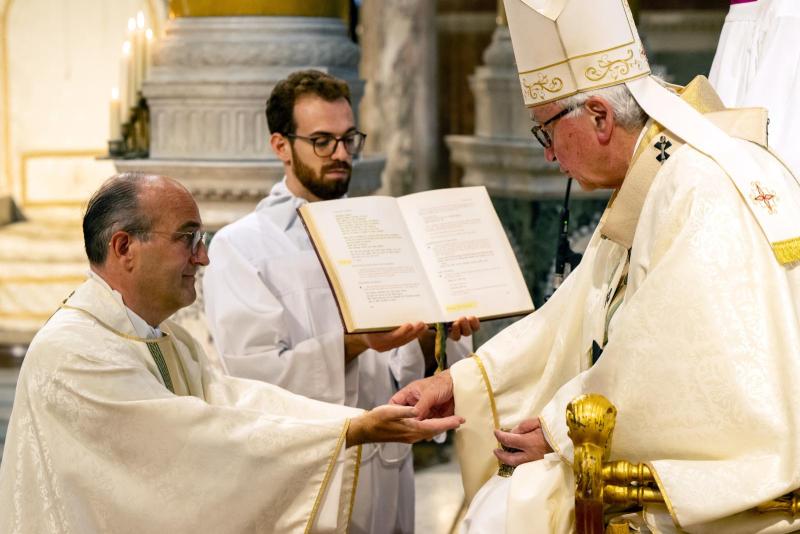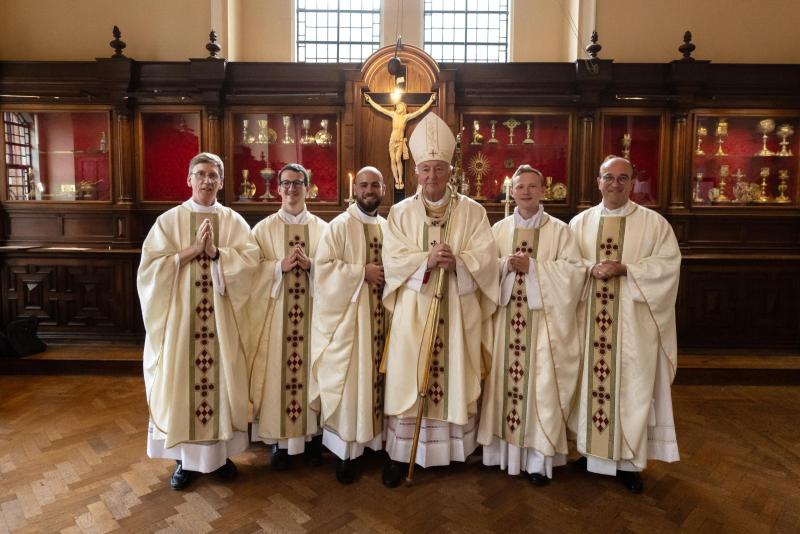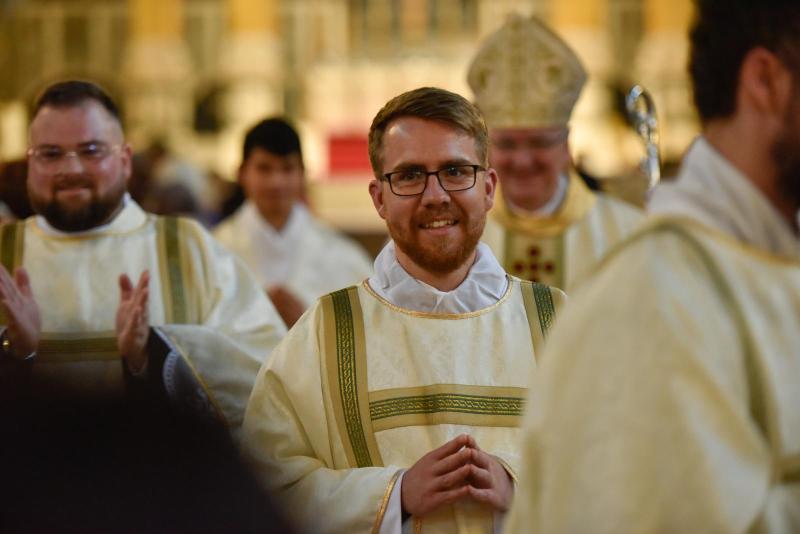On Saturday 16th March 2019 six seminarians from Allen Hall Seminary were instituted into the Ministry of Reader by Bishop Alan Williams of Brentwood Diocese: Mark Ashwood from East Anglia, Jakub Joszko from Westminster, Michael Oxenford from Westminster, Marco Salvagnini from Westminster, Francis Thomas from Westminster, Damien Wade from Brentwood.
The Ministry of Reader is summarised in Saint Pope Paul VI's Motu Proprio Ministeria Quaedam: ‘The reader is appointed for a function proper to him, that of reading the word of God in the liturgical assembly. Accordingly, he is to proclaim the readings from sacred Scripture, except for the gospel in the Mass and other sacred celebrations; he is to recite the psalm between the readings when there is no psalmist; he is to present the intentions for the general intercessions in the absence of a deacon or cantor; he is to direct the singing and the participation by the faithful; he is to instruct the faithful for the worthy reception of the sacraments. He may also, insofar as may be necessary, take care of preparing other faithful who are appointed on a temporary basis to read the Scriptures in liturgical celebrations. That he may more fittingly and perfectly fulfil these functions, he is to meditate assiduously on sacred Scripture.
‘Aware of the office he has undertaken, the reader is to make every effort and employ suitable means to acquire that increasingly warm and living love and knowledge of Scripture that will make him a more perfect disciple of the Lord.’
Below are reflections from some of those who received the Ministry of Reader.
‘Receiving the Ministry of Reader has been a very important point in my formation. It is so because the Scriptures have always played an essential part in my spiritual life.
‘Since I was a child, I was taught by my parents about the importance of the Bible stories. Particularly on Sunday mornings, we would pray together, and everyone would share how the readings of the day spoke to them. It was very helpful to me to see how the Word was enlightening my parents’ lives and how significant it was to the life of my family.
‘Furthermore, the very beginning of my vocation can be found in the word of God. It was at the age of 16 when I went to Loreto for the meeting with the Pope, where I received the word of the call of John the Baptist which I understood to be a sign of God’s call to the priesthood. God used precisely his word to convey this crucial message for my life!
‘Subsequently, my appreciation of the Bible grew as I faced different challenges in my life and experienced that God would guide me through his sacraments and his word at Mass. I found that on many occasions it enlightened the situation I was in and it helped me to experience God’s love and care in my daily life.
‘When I entered the seminary, I started to pray Lectio Divina on a weekly basis and I quickly found that this way of prayer was the most nurturing one for me. It allowed me to enter into a deeper relationship with Christ, the Word Incarnate, who would not only console me, but often, also challenge my way of living and call me to a more profound intimacy with him and love towards my neighbour.
‘An essential part of formation in the seminary is the study of the Bible which has proved to be quite instructive in terms of discovering its richness and relevance in today’s world. There is much more to it than meets the eye and it is crucial for us seminarians to learn how to pass this knowledge on to others. Similarly, the training in homiletics (the art of preaching or writing sermons) made me aware of the importance of developing a personal relationship with the Word of God not only for my individual benefit, but as a service to those I am called to serve in the Church.
‘I have no doubt that receiving the Ministry of Reader has not only been an important step in my formation, but was also an occasion to make me aware that there is a mission ahead of me, and indeed of every Christian, to proclaim the Word of God if necessary also with words.’
Jakub Joszko, 5th Year, Westminster
‘Receiving the Ministry of Lector is a great gift and responsibility. It has made me think carefully of the enormous impact that this ministry will make on my vocational journey. It is far more than just delivering the words written in the Bible. It means, for me, a more intimate relationship with the Word of God so that I can get closer to the mystery of God.
‘Perhaps the most important means to continue growing my relationship with God is in a deep understanding of Scriptures, both academically in the courses I take at Allen Hall but also in the study of the daily Mass readings and personal prayer. That way when I am reading the Scriptures in my parish I am not just saying words but reflecting and responding to them in spiritual way so they can have a positive effect in the lives of all those who hear it.
‘I hope that more people can come to know the richness of the Scriptures and all that God has to say to us.’
Michael Oxenford, 3rd Year, Westminster
‘The Ministry of Reader constitutes an important step in the journey of formation towards priesthood. Particularly, this event reinforces the perception in the candidate of the importance of developing an intimacy with God by pondering and meditating the Scriptures. Personally, the word of God has always had a crucial role in my life. Since I was a child, I have been taught by my parents how to interpret the events of my life in the light of the word of God. Every Sunday, my family would gather together to pray the morning prayer. My parents would then lead a dialogue with us children, starting from either the Sunday Gospel or a story from the Bible. They would help us discover how God through Scripture makes himself present in the events of our lives. As a result of this I began to learn to gradually see how God is present in my life, and how through every event, he reveals his love for me as I am.
‘During my years of formation in the seminary my appreciation of the Bible has increased considerably through the Scripture lectures. Here I learnt to expand my knowledge of it. Furthermore, through exegesis (critical explanation/ interpretation of a spiritual text) I am learning to consider the impact and significance of the word of God both in the historical context when this word was first announced and to our present time. This has proved to be useful especially in pastoral situations. I see echoes of this also during the homiletics classes, which constitute part of my formation at Allen Hall.
‘Another source of knowledge and familiarity with Scripture is the weekly Lectio Divina, which I attend in a communitarian context in the seminary. This has helped me to relate to Scripture not just as a text to study and develop, but to see how Scripture is the word of God that speaks directly to my life in whatever situation I am experiencing.
‘In addition, I can see how my familiarity with the word of God has grown immensely throughout these years in the Neocatecumenal Way. We have weekly meetings where the word of God is read from different passages of the Bible, and a possibility to share how this word is presented as a help to deal with a personal problem is given. This has helped and is helping me a lot in living my life of faith.’
Marco Salvagnini, 5th Year, Westminster
‘I grew up hearing the word of God at Mass and through familiar Bible stories that I was taught at school, from the Feeding of the Five Thousand to the Prodigal Son. I read at Mass from an early age and continued to do so right through until university. However, it was only at seminary that I have really begun to study the Scriptures, both academically and personally.
‘This has been helped in a tremendous way by our Lectio Divina group, where we prayerfully read the Gospel for the coming Sunday. We then spend about ten minutes meditating on a particular word or phrase that has spoken to us. We ask in that silence what is God trying to say to me, what does he want from me, here and now, as a Catholic Christian, as a seminarian.
‘The next period is given over to sharing those reflections with others in the group and hearing how God is working in their life (often in completely different ways to yourself). Finally, in response, we pray to God, thanking him for what has been shared and asking for his help in taking the next steps to come closer to him in our daily lives. It means that by the time I hear the Gospel on Sunday I have already personally responded and now listen to how God, through the homily, wants to speak to us as a Christian community.
‘This ministry has given me a huge encouragement to delve ever deeper into the transformative richness of the Scriptures and personally respond to the story of God’s enduring and abounding love for humanity as shown throughout the Old Testament and most definitively in the New Testament through Jesus Christ’s life, death and resurrection.
‘It is with great joy and much trepidation that I journey towards the priesthood and one day to proclaim the Gospel and preach its message at Mass.’
Francis Thomas, 2nd Year, Westminster
